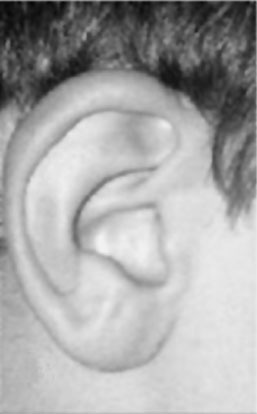File:Beckwith-Wiedemann syndrome ear lobe creases.jpg
Beckwith-Wiedemann_syndrome_ear_lobe_creases.jpg (257 × 414 pixels, file size: 12 KB, MIME type: image/jpeg)
Beckwith-Wiedemann Syndrome
Beckwith-Wiedemann syndrome is a congenital disorder first recognized in 1964 by Dr. H.R. Wiedemann, a geneticist, and then in 1969 by Dr. J. Bruce Beckwith, a pediatric pathologist.
Ear lobe creases were first described by Irving (1967) and then used as one of the criteria for diagnosis of the illness, and/or pit indentations on the posterior helix.
Reference
<pubmed>12920477</pubmed>| Sao Paulo Med J.
<pubmed>4865835</pubmed>
All the content of the journal, except where otherwise noted, is licensed under a Creative Commons License.
File history
Click on a date/time to view the file as it appeared at that time.
| Date/Time | Thumbnail | Dimensions | User | Comment | |
|---|---|---|---|---|---|
| current | 10:16, 23 November 2010 |  | 257 × 414 (12 KB) | S8600021 (talk | contribs) | ==Beckwith-Wiedemann Syndrome== Beckwith-Wiedemann syndrome is a congenital disorder first recognized in 1964 by Dr. H.R. Wiedemann, a geneticist, and then in 1969 by Dr. J. Bruce Beckwith, a pediatric pathologist. Ear lobe creases were first described b |
You cannot overwrite this file.
File usage
There are no pages that use this file.
